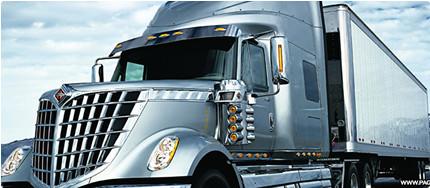Review Questions - Click On The Picture To Begin...

- Stop in an open area
- Stand up wind and use a fire extinguisher
- Turn the engine off as soon as possible
- Pull into a service station
Quote From The CDL Manual:
Knowing how to fight fires is important. Fires have been made worse by drivers who do not know what to do. Know how the fire extinguisher works. Study the instructions printed on the extinguisher before you need it. Follow these procedures in case of a fire:
- Pull off the road: The first step is to get the vehicle off the road and stop.
- Park in an open area, away from buildings, trees, brush, other vehicles or anything that might catch fire.
- Do not pull into a service station.
- Notify emergency services of your problem and your location.
- Checking all air hoses for leaks
- Ensuring tandem locking pins are in place
- Making sure tires are not under-inflated
- Looking for any leaking or under-inflated air bags
Quote From The CDL Manual:
Truck fires can cause damage and injury. Learn the causes of fires and how to prevent them. Know what to do to extinguish fires. Following are some causes of vehicle fires:
� ���- ��� ���
- After accidents - Spilled fuel, improper use of flares. ��� ���
- Tires - Underinflated tires and duals that touch. ��� ���
- Electrical system - Short circuits due to damaged insulation, loose connections. ��� ���
- Fuel - Driver smoking, improper fueling, loose fuel connections. ��� ���
- Cargo - Flammable cargo, improperly sealed or loaded, poor ventilation. ���
Fire Prevention
�Pay attention to the following:
��� ���- � ��� ���
- Pre-trip inspection - Make a complete inspection of the electrical, fuel and exhaust systems, tires and cargo. Be sure to check that the fire extinguisher is charged. � ��� ���
- Enroute inspection - Check the tires, wheels and truck body for signs of heat whenever you stop during a trip. � ��� ���
- Follow safety procedures - Follow correct safety procedures for fueling the vehicle, using brakes, handling flares and other activities that can cause a fire. � ��� ���
- Monitoring - Check the instruments and gauges often for signs of overheating, and use the mirrors to look for signs of smoke from tires or the vehicle. ���
TruckingTruth's Advice:
In very hot weather, an under inflated tire can easily reach high enough temperatures to start a fire. Tire fires are almost impossible to put out even with a fire extinguisher or plenty of water so it's best to avoid a tire fire from occurring in the first place. It's critically important that you keep your tires properly inflated, especially during very hot weather.
- Open the trailer doors
- Keep the trailer doors closed
- All of these options should be considered when experiencing a cargo fire
- Continue driving in order to "blow out" the flames
Quote From The CDL Manual:
For a cargo fire in a van or box trailer, keep the doors shut, especially if your cargo contains hazardous materials. Opening the van doors will supply the fire with oxygen and can cause it to burn very fast.
- Stop in a shaded location, such as under a bridge or overpass
- Keep the hood closed
- Open the hood and use a fire extinguisher
- Rev the engine to high RPM's in order to "suck" the fumes out
Quote From The CDL Manual:
With an engine fire, turn off the engine as soon as you can. Do not open the hood if you can avoid it. Shoot extinguishers through louvers or radiator or from the underside of the vehicle.
- A wood fire
- A cloth fire
- A paper fire
- A gasoline fire
Quote From The CDL Manual:
Water can be used on wood, paper or cloth, but do not use water on an electrical fire (you could get shocked) or a gasoline fire (it will just spread the flames).
- Feel the exhaust stack to make sure it's not excessively hot
- Open the hood and take a temperature reading of the engine coolant to be sure it's within manufacture specifications
- Uncouple the emergency brake line to see how hot the air is
- Check the tires, wheels and truck body for signs of heat whenever you stop during a trip
Quote From The CDL Manual:
Enroute inspection: Check the tires, wheels and truck body for signs of heat whenever you stop during a trip.







 TT On Facebook
TT On Facebook